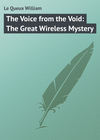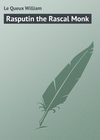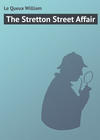Loe raamatut: «The Under-Secretary», lehekülg 8
Suddenly he roused himself, and, walking forward a couple of paces, marked with his stick a square in the dead leaves. Apparently he was deep in calculation, for after he had made the mark he carefully measured, by means of his cane, the distance between the square and the top of the short ascent. On either side of the path was a steep moss-grown bank surmounted by thick hazel-bushes, but on the left a little distance up was an old wooden fence, grey with lichen. He appeared to be deeply interested in this fence, for after going close up to it he measured by careful pacing the distance between it and the spot he had marked out.
When this was done, he stood again motionless, his fevered brow bared to the breezes as though to him that spot were hallowed. Then, crossing the stile, he entered the meadow, passing and repassing the narrow lane as though for the purpose of discovering the exact position an observer would be compelled to take up in order to watch a person standing at the point he had marked.
At last he returned, standing again with his back to the stile, his hat raised in reverence, gazing fixedly upon those dead and decaying leaves.
“Yes,” he murmured, “I was mad – mad! The devil tempted me, and I fell. Would to God that I could make amends! But I cannot – I dare not. No, I must suffer!”
Chapter Fourteen.
Which Demands Explanation
Chisholm dined that night in the upstairs room of that old-fashioned hostelry, the Angel, at Godalming, in company with the brethren of the banner.
He sat at the right of the estimable, fat-handed butcher who presided, and was informed by him that as the gigantic roast sirloin that was served was his “own killing,” he could recommend it. They ate, drank, and made merry, these men banded together by their sacred rites, until the heat grew so intense that the windows were opened, with the result that decorous High Street echoed to the volleys of their hearty laughter.
As drink was included in the cost of the repast, those diners with the more rapacious appetites – who, indeed, made no secret that they had been existing in a state of semi-starvation all day in order to eat at night – drank indiscriminately of the lemonade, beer, wine and whiskey placed upon the table. Indeed, as is usual at such feasts, they ate and drank all within reach of their hands. But these bearded working-men and small tradesmen were merry and well-meaning with it all. After “The King” had been honoured, they toasted with boisterous enthusiasm “Our Honourable Member,” and joined in the usual chorus of poetical praise, “For he’s a jolly good fellow.”
Dudley sat bowing and smiling, yet at heart sick of the whole performance. He dreaded the pipes and cigars that would in a few moments appear. Shag and clays always turned him ill. He was no great smoker himself, and had never been able to withstand the smell of a strong cigar.
His quick eyes observed a man who was beginning in an affectionate manner to fondle a well-coloured short clay. He bent at once to the chairman, saying that he would now deliver his speech.
“Silence, please, gentlemen!” shouted the rotund butcher, rapping the table with his wooden mallet after their guest’s health had been drunk. “Silence for our Honourable Member! Silence —please!”
Then Dudley rose eagerly, happy in the knowledge that he was almost through the ordeal, and, with a preliminary “Mr Chairman and Gentlemen,” addressed the hundred or so of his faithful supporters, telling them this and that about the Government, and assuring them of the soundness of the policy adopted by Her Majesty’s Ministers. It was not a very long speech, but it was upon a subject of the moment; and as there were two “gentlemen of the Press” representing the local advertisement sheets, the one a mere boy, and the other a melancholy, disappointed-looking man, with a sage and rather ascetic expression, the speech would appear in the papers, and the Godalming Lodge of Odd Fellows would receive the credit of having entertained one of England’s most rising statesmen. The two representatives of the Press, each of whom took himself very seriously, had been regaled with a bottle of port and some cigars by the committee, who entertained a hope that they would thus be induced to give a lengthy and laudatory account of the function.
While Dudley was on his legs the cloud of tobacco-smoke became thicker and thicker. Those triumphs of the tobacconist called “tuppenny smokes” are nauseous when in combination with the odour of food. Dudley sniffed them, coughed slightly, sipped some water, and then drew his speech to a close amid a terrific outburst of applause and a beating upon the tables which caused the glasses and crockery to jingle.
While this oration was in full blast he noticed a committee-man uncovering the piano, by which he knew that “harmony” was to embellish the hot whiskey period. At last, however, he managed to excuse himself, upon the plea that he must return to the House for a Division that was expected; and as soon as he was out in the High Street he breathed more freely. Then he hurried to the train, and, entering the express from Portsmouth, tried to forget the spot he had visited in that small belt of forest – the scene that too often commanded the most vivid powers of his memory.
“I was a fool ever to have gone there! – an absolute fool!” he murmured to himself, as he flung himself back in the first-class compartment when alone. “I ran an unnecessary risk. And that man who came so suddenly upon me just as I was leaving! What if he had watched and recognised me? If so, he would certainly gossip about my presence there, describe my actions – and then – ”
He was silent; his face became blanched and drawn.
“Even though six years have passed, the affair is not forgotten,” he went on in a hard voice. “It is still the local mystery which Scotland Yard failed to elucidate. Yes,” he added, “I was a fool – a confounded fool! What absurd whim took me to that place of all others, I can’t imagine. I’m mad – mad!” he cried in wild despair. “This madness is the shadow of suicide!”
Instead of going down to the House he drove back at once to his chambers.
Upon his table was a note from Claudia, affectionate as usual, and full of regret that they had not met again on the previous night – when they had been so suddenly separated at Penarth House.
“What do you think of little Muriel Mortimer? I saw you speaking with her,” she wrote. “She was full of you when I met her shopping in Bond Street this morning. You have made quite an impression, my dear Dudley. But don’t altogether forget me, will you?”
Forget? Could he ever forget the woman whom he loved, and yet despised? Strange that Claudia should have plotted with Lady Meldrum against his bachelor estate, and should have determined to bring about this marriage with Muriel Mortimer!
In a frenzy of despair he cast her letter into the flames. He recollected the words she had uttered to him in that room on the previous night, the sweet words of love and tenderness that had held him spellbound. No, there was no other woman in all the world save her – and yet, she was false and fickle, as all the world knew.
Life’s comforts are its cares. He smiled bitterly as he reflected upon that phrase, which was an extract from one of his many brilliant speeches. If a person has no cares, that person must make them, or be wretched; care is actually an employment, an action; sometimes even a joy. And so it is with love. Life and love must have employment and action. There must be responsibility and a striving to reach a goal; for if not, both the power to endure and the power to give comfort are shrunken and crippled.
When Dudley Chisholm was young he had long worshipped an ideal. But when he found his idol to be undeserving of the idolatry, madness fell upon him, and he accepted the creed of the prodigal. Raking over the ashes of the numerous bonfires he had made, for which his senses had been the fuel, he now found a revelation of his inner self. He recognised for the first time his weakness and his unworthiness. He wanted something better than he had known – not in others, but in himself. He had discovered a spot of tenderness in his heart that had, so to speak, remained virgin soil.
“Could a really smart woman possess any nice sense of honour?” he asked himself for the hundredth time. If she is endowed with any particular intelligence, and the world discovers it, then society is prone to think that she is necessarily a “schemer,” and, unless her friends know her very well, she is soon given a place upon society’s black list as an “adventuress,” a term which applies to the whole gamut of West End wickedness. No, after all, few women can be both honourable and smart.
His thoughts wandered back into the past, as they so frequently did, and a moan came from his heart. He remembered Claudia as an ideal woman of whom a cruel Fate had robbed him in those days before he learned the world to be what it is. And he still loved her – even though this great gulf yawned between them.
Dudley Chisholm was blind to Claudia’s true character. He was attracted to her by her intellect and her physical magnetism. In these days of her freedom she had dared to be herself, and having knowledge of herself and of men, she had developed his admiration up to her own standpoint. She had taught him women as she knew them herself. She was playing with all the edged tools of daring because she felt that she was the stronger of the two, and that he would dare no further than she willed. She was charmed with the freedom she allowed herself; while he was, in a manner, flattered by her apparent constancy to him and by her finding in him anything that interested a woman of her attainments and popularity. Thus he had become thoroughly interested, madly infatuated, as well as honestly in love.
Men so seldom understand the inner nature, the designing nature, if I may be forgiven the expression, of some women. Such women are unscrupulous in their dealings both with men and women. The West End is full of them. They live for what they can get out of their acquaintances, instead of for what they can do for them. They give as much love to all as to one, unless that one should happen to be more wealthy or distinguished than the others. Then the wealthy one will get the largest quantity of attention, while the others will be kept dangling on the string for use at odd times. Such women are shrewd. Mayfair has taught them the art of conversation. They have reduced it to a science. With the innocent face of a child, they learn never to let the left hand know what the right hand is doing. And, if the bare truth be stated, Claudia Nevill was one of these. She, in her shrewdness, had handled Dudley with light ribbons. She had intuitively understood what kind of woman he preferred, and she had been that woman – until now, when the bitter truth had been made plain to him.
In this life of ours the tossing between the extremes of happiness and misery are terribly wearying. When once life’s lessons begin they continue in a mad headlong rush of events. During the last few days Dudley Chisholm seemed to have lived a lifetime. Fate twisted and turned him through and round human follies and treachery. It laughed at him, beating up all that was false against all that was true in his own nature, until he found himself in such a pot-pourri of sunshine and storm that life seemed suddenly too incomprehensible to be endured.
The daintiness of women rivets and enchains men of Dudley’s stamp – the perfume of the hair, the baby-smell of the skin, the frills, the laces, the violets exuding from the chiffons, the arched foot, the neat ankle, the clinging drapery – everything, in fact, that means delicate luxury not to be enjoyed save in the company of a woman. Awkwardness disenchants, but well-poised, graceful lines, added to a chic in dress, hold for ever. To be essentially feminine places a woman in the holy of holies in a man’s heart. As Claudia was essentially feminine, she still held Dudley safe, in spite of that sudden gust of scandal.
Alone, seated in his familiar armchair, he cast aside the heavy thoughts that had so oppressed him ever since he had stood at that spot deep in rural Surrey, and looked upon the place every object of which was photographed upon his memory. He thought of Claudia, and, remembering the declaration of her love whispered in that room, felt regret at the hard words he had uttered. She had made mistakes and become entangled in the meshes of the net spread out for her. Was it not his duty to extricate her? He too had made a mistake in not paying respect, at least outwardly, to the social code, and now the time had come when he was forced to recognise that necessity. Yes, in his inner consciousness he fully realised the mistake he had made. He had all unconsciously aided and abetted her in becoming what was known as “a smart woman.”
Perhaps, however, his opinion of her would have been a different one had he been present at that moment in one of the smaller sitting-rooms of the great mansion at Albert Gate. It was a cosy apartment, with the lamplight mellowed to a half tone by the yellow shade; dull greyish blue was the colour of the silken walls, a cool, restful tint that seemed a fitting background for the cosy lounge draped with dark Egyptian red and suppressed greens and yellows.
Upon the couch, in a handsome dinner-gown of pale pink trimmed with black velvet, lazily lounged its mistress among her silken pillows, slowly waving her fan, while near her in one of the big saddle-bag chairs sat the Grand-Duke Stanislas smoking a cigarette, his eyes fixed upon her.
At his throat he wore the ribbon of St. Andrew, one of the highest of the Russian orders, the splendid diamond cross glittering upon his shirt-front. He was on his way to a reception at the Austrian Embassy given in his honour by the ambassador, but at Claudia’s invitation he had dined with her.
“No, really,” she was laughing, “it is not so in England. I quite admit that men make it a general accusation against us, as a sex, that we are ill-natured, unfair, pitiless, in judging one another. They say that when women get together, at every word a reputation dies; they say that as a savage proves his heroism by displaying in grim array the torn scalps of his enemies, so a woman thinks she proves her virtue by exhibiting the mangled reputations of her friends; they say – But there is no end to the witty impertinences and fag-ends of rhymes from Simonides to Pope, which they fling at us on this subject I have never heard men so eloquently satirical as when treating with utter scorn the idea that a woman can possibly elevate herself in the eyes of one of their sex by degrading, or suffering to be degraded, one of her own; and in their censure they are right – quite right; but wrong – quite wrong in attributing this, our worst propensity, to ill-nature and jealousy. Ignorance is the main cause: ignorance of ourselves and others.”
He laughed at her philosophy, and blew a cloud of smoke towards the ceiling.
“I think, my dear madame, that you must be full of whims, comme disent les Anglais. A pretty woman like yourself always is,” he said in his marked foreign accent.
“And why not?” she inquired, for he had suddenly changed the channel of their conversation, and she much feared that he now intended to give her a réchauffé of his sentimental nonsense.
“Because you brought your friend to the duchess’s last night. I saw him. C’etait assez.”
“You are jealous – eh?”
“Not in the least, I assure you,” he answered quite coolly. “Only it is pretty folly on madame’s part – that is all.”
“Why folly? O la belle idée!”
“Madame’s amitiés are of course friendships,” he said, raising his dark eyebrows. “Nevertheless, she should be warned.”
“Of what?”
“Of Monsieur the Under-Secretary,” he replied, still regarding her quite calmly with his dark eyes. “For her own reputation madame should no longer be seen with him.”
She glanced at her guest quickly, for she was used to men’s jealousies. Yet surely this scion of an Imperial House could not be jealous!
“And for what reason, pray?” she asked, puzzled.
“Because of a regrettable circumstance,” he answered mysteriously. “Because of a forthcoming exposure which will be startling. In a certain Chancellerie in a certain capital of Europe there reposes a document which must shortly be made public property.”
“Well, and what then?” she asked, not yet grasping his meaning.
“Its publication will bring disgrace and ruin upon madame’s friend,” he answered simply. “That is why I warn you not to be seen again in his company.”
“What do you mean?” she cried, starting up with sudden hauteur. “You tell me this, in order to turn me from him.”
“No, ma chère, I tell you a secret which is known in the Chancellerie of a certain Power antagonistic to your country,” he responded. “I have told madame the truth for her own benefit.”
“You would try to poison my mind against Dudley Chisholm by hints such as these!” she cried, magnificent in her sudden fury. “You! – You! But let me tell you that I love him – that – that – ”
“That you refuse to believe my word!” he said, concluding her unfinished sentence.
“Yes, that I absolutely refuse to believe you!” she declared emphatically, facing him boldly in a manner which showed that her nature had revolted against this attempt to denounce the man she loved.
“C’est assez!” he laughed with an air of nonchalance the moment he had blown a cloud of smoke from his lips. “Madame has spoken!”
Chapter Fifteen.
Is told in the Grass Country
Throughout November Dudley remained in town tied to the House by his official duties, and saw little of Claudia, who had gone into Leicestershire for the hunting. Riding to hounds was her favourite sport, and she was one of the best horse-women within fifty miles of Market Harborough. Each season she went on a visit to Lady Atteridge, whose husband had a box right in the centre of the hunting-country, and at every meet she was a conspicuous figure.
An acquaintance she made in the field with the late Empress of Austria, during a run with the Pytchley across the Grafton country, ripened into a warm friendship, and on many occasions she had entertained her now lamented Majesty at Albert Gate. Nearly every year some foreign royalty or other is the centre of hunting interest. Unable to enjoy the race over the grass in their own land, they come to England for healthful sport, and generally make Harborough their headquarters. That season it was the Grand-Duke Stanislas who rode to nearly every meet, always accompanied by his equerry. Hence Claudia and he frequently met, but since that evening when he had endeavoured to turn her from the man she loved she had avoided him. She purposely refrained from attending any function at which he might possibly be present, and when they were compelled to meet with the hounds she only bowed, and seldom, if ever, offered him her hand.
On his part, he was always fussing about her, scolding her for her too reckless riding across boggy meadows, or at hedges made dangerous by barbed wires, and always holding himself prepared to render her any of those many little services which the hunting-man renders the fair sex in the field. But on her part she was absolutely indifferent to his attentions, and at the same time annoyed that he should thus publicly exhibit his admiration.
Certainly no figure was more neat and chic than hers in its well-cut habit, her dark hair tightly coiled beneath her becoming hunting-hat. In the saddle she looked as if she were part of the animal she rode, and her mare, “Tattie,” was a splendid creature, which always came in for a full share of praise among those who could tell a good hunter when they saw one. The men who ride to hounds in the Harborough country are, as a rule, hard as nails, and as keen and outspoken critics of a woman as of a horse. But Claudia Nevill and “Tattie” were both pronounced first-class, the former because she was so extremely affable with one and all, even to the farmer’s sons who followed the hounds, and blushed with a countryman’s awkwardness when she, the woman of whom the papers spoke, addressed them. There was no pride about her ladyship, and the whole countryside, from Harborough right across to Peterborough, declared her to be “one of the right sort.”
Of course even in the villages there were whispers that she was very friendly with the Grand-Duke, and the usual deductions were made from the fact that the latest foreign star in the hunting-firmament was always riding near her. But in the country the people are very slow to give credence to scandal, and the gossip, though active, was not ill-natured; besides, it had long ago been known that the Foreign Under-Secretary was passionately attached to her. Last season Chisholm had hunted with the Pytchley and had been always at her side, so that the rustics, and even the members of the hunt had come to regard him as her future husband, and had pronounced them to be a well-matched pair.
Late one afternoon towards the close of November the end of a busy day was drawing near. The meet was at Althorpe Park, Earl Spencer’s seat, and the spinneys all around the park were drawn one after the other; but although plenty of pretty hunting took place, the hounds did not do any good. On drawing No-bottle Wood the greater portion of the large field managed to get away with the pack as the hounds raced away up wind in the direction of Harlestone. The first fox led his pursuers over fine grass country to a copse near Floore, where the sight of hounds in full cry, a rare occurrence, caused considerable excitement among the villagers. Continuing past Weedon Beck, the fugitive circled round in the direction of Pattishall, but he was so hotly pressed that he was obliged to take shelter in a drain near Bugbrook, where it was decided to leave him. The second fox, which was started from Dowsby Gorse, gave a fine run of an hour. He travelled first to Byfield, thence across the hilly country back to Weedon Beck, over almost the same district as his predecessor. Near Weedon reynard had an encounter with some terriers belonging to a rabbiting party, but got safely away and finally beat the pack close to the Nene.
The run had been a very fast one, but both Claudia and Stanislas were among the few in at the finish. As many of the hunters jogged homeward along the Daventry road, the Grand-Duke managed to take up his position by the side of the beautiful woman whom he so greatly admired. Stanislas, who was an excellent rider, had left his equerry far behind in the mad race across hedges, ditches, stubble and ploughed land. Somewhat bespattered by mud, he sat his horse with perfect ease and with almost imperial dignity. To the casual observer there was nothing to distinguish him from any of the other hunters, for in his well-worn riding-breeches, gaiters and black coat his appearance was devoid of that elegance which had distinguished him in London society, and he looked more like a country squire than the son of an emperor.
They were descending the slope towards a small hamlet of thatched cottages, when of a sudden he drew his horse closer to hers and, turning to her, exclaimed in English of rather a pleasant accent:
“Madame is, I fear, fatigued – of my company?”
“Oh dear no,” she laughed, turning her fine dark eyes mischievously towards him. “Why should I be? When you are so self-sacrificing as to leave Muriel Mortimer to Captain Graydon’s charge and ride with me, I surely ought not to complain.”
“Why do you speak of Mam’zelle Mortimer?” he asked, at once grown serious.
“Because you have been flirting with her outrageously all day. You can’t deny it,” she declared, turning to him in her saddle.
“I was merely pleasant to her,” he admitted. “But you English declare that a man is a flirt if he merely extends the most commonplace courtesies to a woman. It is so different in other countries.”
“Yes,” she laughed. “Here, in England, woman is fortunately respected, but it is not so on the Continent.”
“I trust that madame has not found me indiscreet,” he said earnestly. “If I have been, I must crave forgiveness, because I am so unused to English manners.”
“I don’t think any one need blame you for indiscretion, providing that Muriel does not object.”
“Object? I do not follow you,” he said.
“Well, she may object to her name being bandied about as a woman with whom you are carrying on an open flirtation.”
“You appear to blame me for common civility to her,” he observed. “I cannot, somehow, understand madame of late. She has so changed.”
“Yes,” she answered with a bitter smile; “I have grown older – and wiser.”
“Wisdom always adds charm to a woman,” he replied, endeavouring to turn her sarcasm into a compliment.
“And age commands respect,” she answered.
He laughed uneasily, for he knew well her quick and clever repartee.
“I have been wishing to have a word with madame for a long time,” he said, at last breaking a silence that had fallen between them. “You have pointedly avoided me for several weeks. Have I given you offence? If so, I beg a thousand pardons.”
She did not answer for some time. At heart she despised this Imperial Prince, before whom half the women in London bowed and curtsied. She had once allowed him to pay court to her in his fussy, foreign manner, amused and flattered that one of his degree should find her interesting; but all that was now of the past. In those brief moments as they rode together along the country road in the wintry twilight, recollections of summer days at Fernhurst came back to her, and she hated herself. In those days she had actually forgotten Dudley. And then she also remembered how this man had condemned her lover: how he had urged her to break off the acquaintance, and how he had hinted at some secret which, when exposed, must result in Dudley’s ruin.
Those enigmatical words of his had caused her much thought. At what had he hinted? A thousand times had she endeavoured to discover his meaning, but had utterly failed. If such a secret actually existed, and if its revelation could cause the downfall of Dudley Chisholm, then it was surely her duty to discover it and to seek its suppression. This latter thought caused her to hesitate, and to leave unsaid the hasty answer that had flashed into her mind.
“Well,” she said at length, “now that you have spoken plainly, I may as well confess that I have been annoyed – very much annoyed.”
“I regret that!” he exclaimed with quick concern. “If I have caused madame any annoyance, I assure her it was not in the least intentional. But tell me how I have annoyed you.”
“Oh, it was a small matter, quite a trivial one,” she said with affected carelessness, settling her habit and glancing furtively at the man who had declared that he held her lover’s secret.
“But you will tell me,” he urged. “Please do. I have already apologised.”
“Then that is sufficient,” she replied.
“No, it is not sufficient I must know my offence, to be fully cognisant of its gravity.”
Her brows contracted slightly, but in the fading light he did not notice the shadow of annoyance that passed across her countenance.
“As I have told you, the offence was not a grave one,” she declared. “I was merely annoyed, that is all.”
“Annoyed by my actions, or by my words?”
“By your words.”
“On what occasion?”
“On the last occasion you dined at my house.”
For a moment his face assumed a puzzled expression, then in an instant the truth flashed upon him.
“Ah!” he cried; “I recollect, of course. Madame has been offended at what I said regarding her friend, the Under-Secretary. I can only repeat my apologies.”
“You repeat them because what you told me was untrue!” she exclaimed, turning and looking him full in the face. They had allowed their horses to walk, in order to be able to converse.
“I much regret, madame, that it was true,” he replied.
“All of it?”
“All of it.”
“And there exists somewhere or other a document which inculpates Dudley Chisholm?”
“Yes, it inculpates him very gravely, I am sorry to say.”
“Sorry! Why?”
“Well, because he is madame’s friend – her very best friend, if report speaks the truth.” There was a sarcastic ring in his words which she did not fail to detect, and it stung her to fury.
“I cannot see why you should entertain the least sympathy for my friend,” she remarked in a hard voice. “More especially for one unknown to you.”
“Oh, we have met!” her companion said. “We met in Paris long since on an occasion when I was travelling incognito, and I liked him. Indeed, he was dining at the Carlton a week ago at the next table to me.”
“And you are aware of the nature of this secret, which, according to what you tell me, must some day or other bring about his utter downfall?”
“Ah, no. Madame misunderstands me entirely,” he hastened to protest. “I am not a diplomatist, nor have I any connection, official or otherwise, with diplomacy. I merely told you of a matter which had come to my knowledge. Recollect, that a young man in Chisholm’s position of responsibility must have a large number of jealous enemies. Perhaps it will be owing to one of these that the secret will leak out.”
“It will be used for a political purpose, you mean?”
“Exactly,” replied the Grand-Duke. “Your Government, what with the two or three contending parties, is always at war, as it were, and the Opposition, as you term it, may, as a coup de grace to the Government, reveal the secret.”
“But you told me that it was a document, and that it reposed safely in one of the Chancelleries in a foreign capital, if I remember aright,” she said. “Now, tell me honestly, is St. Petersburg the capital you refer to?”
“No, it is not,” he replied promptly.
“And the Embassy in London that is aware of the truth is not in Chesham Place?”
“Most assuredly not, madame,” he replied.
“Cannot you be more explicit,” she urged. “Cannot you, if you are my friend, as you have more than once declared yourself to be, tell me more regarding this extraordinary matter which is to create such a terrible scandal?”




















